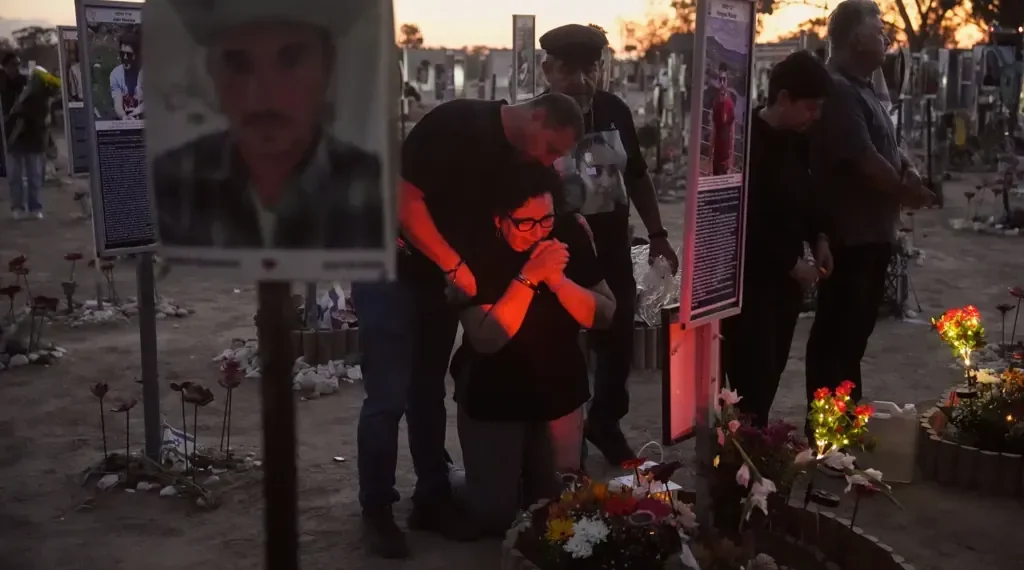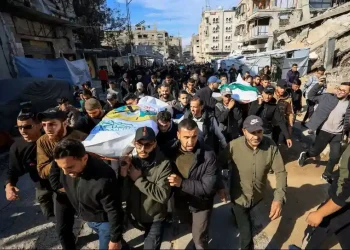Israel and Gaza Mark Two Years Since War as Peace Talks Resume in Egypt
Published: October 7, 2025, 22:15 EDT
Israel and the Palestinian territories marked two years since Hamas’ October 7, 2023 assault triggered one of the deadliest and most consequential wars in the region’s history. As mourners gathered across southern Israel and displaced families sought safety in Gaza, indirect talks between Israel and Hamas resumed in Egypt under a U.S.-backed peace plan aiming to secure a lasting ceasefire and the release of remaining hostages.
Israelis Gather to Remember the Victims
Thousands gathered across southern Israel on Tuesday to mourn victims of the Oct. 7, 2023 attacks, which killed around 1,200 people and left deep scars across the nation. The main memorial, organized by bereaved families, took place near the border communities hit hardest during the assault.
At the site of the Nova music festival in Reim, where nearly 400 people were killed and dozens abducted, attendees held a moment of silence at 6:29 a.m. — the precise time militants stormed the grounds. Photos of victims surrounded the former dance floor as survivors recounted the chaos of that morning.
Israel’s government plans a separate ceremony next week, in line with the Hebrew calendar. The division reflects growing discontent with Prime Minister Benjamin Netanyahu’s handling of the war and hostage crisis. Many relatives accuse the government of failing to secure a long-term ceasefire that could bring home the remaining captives.
Gaza Endures Another Offensive
In the Gaza Strip, the humanitarian toll remains severe. Israel’s ongoing military operations have devastated urban centers and displaced hundreds of thousands. Gaza’s Health Ministry, which operates under Hamas, reports more than 67,000 Palestinians killed since 2023, roughly half of them women and children. The ministry does not distinguish between civilians and combatants, but independent analysts and major rights groups view the figures as the most reliable estimate available.
Entire neighborhoods in northern Gaza have been reduced to rubble as Israeli forces press forward toward Gaza City, sparking another wave of displacement. Many residents, unable to afford the perilous journey south, remain trapped amid shortages of food, medicine, and clean water.
Israel denies accusations of genocide, asserting its operations target Hamas infrastructure and are carried out in self-defense after the October 7 attack.
Egypt Hosts Renewed Indirect Talks
Diplomatic efforts to end the war have resumed in Egypt’s Red Sea resort of Sharm el-Sheikh. Israeli and Hamas negotiators are holding indirect discussions mediated by Egyptian and U.S. officials, focusing on implementing the first phase of a U.S.-drafted peace initiative backed by President Donald Trump.
The proposal seeks an immediate ceasefire in exchange for the release of all remaining hostages held by Hamas in return for hundreds of Palestinian prisoners in Israeli custody. According to Egyptian mediators cited by the Associated Press, both sides have agreed on most of the first-phase terms but continue to debate the timeline and conditions for Hamas’ disarmament — a central Israeli demand.
A senior Hamas official told Al Araby Television that the group would reject any foreign military administration of Gaza, calling the entry of international troops “unacceptable.” Another Hamas representative suggested the group might surrender its weapons to a future Palestinian governing body, though that stance was not included in its formal statement.
Political Divides and Global Reactions
The anniversary has rekindled debate within Israel over Netanyahu’s leadership and the long-term strategy for Gaza. Critics accuse his administration of failing to outline a viable political vision for the post-war period, while supporters argue that continued pressure on Hamas remains necessary to guarantee Israel’s security.
Internationally, leaders across Europe and the United Nations marked the anniversary with solemn statements and renewed calls for peace. German Chancellor Friedrich Merz called Oct. 7 “a black day in Jewish history” and expressed shame over a resurgence of antisemitism since the attack. Swedish Prime Minister Ulf Kristersson described it as “the worst mass murder of Jews since the Holocaust,” while Italian Premier Giorgia Meloni said Israel’s response, though grounded in defense, had caused “too many innocent victims among Gaza’s civilian population.”
U.N. Secretary-General António Guterres issued a statement urging the “immediate and unconditional” release of all hostages. He condemned the suffering endured by both sides and urged leaders to “seize the opportunity to end the cycle of trauma and violence.”
Pro-Palestinian Demonstrations Around the World
In Jakarta, more than 1,000 pro-Palestinian demonstrators marched to the U.S. Embassy to protest Israel’s blockade of Gaza and demand the release of activists detained after attempting to breach the blockade by sea. Protesters waved Palestinian flags and chanted “Free, free Palestine” as police deployed in large numbers to maintain order. Indonesia, the world’s most populous Muslim-majority country, has no formal ties with Israel and has consistently voiced support for Palestinian statehood.
In the United Kingdom, Prime Minister Keir Starmer condemned planned pro-Palestinian protests on university campuses as “un-British,” warning against rhetoric that could incite antisemitism. His comments followed a deadly attack on a synagogue in Manchester days earlier, which heightened tensions nationwide.
The Path Ahead: Fragile Peace and Lingering Uncertainty
Despite renewed diplomatic momentum, major questions remain unresolved. The future governance of Gaza, the status of disarmament, and Israel’s proposed “security perimeter” inside the enclave all remain points of contention.
The U.S.-led plan envisions an eventual transition toward a unified Palestinian administration, but negotiators have yet to clarify how that would be implemented. Analysts warn that without a clear framework for reconstruction and political reconciliation, the cycle of violence could continue.
As families across Israel and Gaza mourn their losses, the region remains suspended between grief and hope — a fragile balance that hinges on whether this latest round of diplomacy can deliver what two years of war could not: a sustainable peace.
This article was rewritten by JournosNews.com based on verified reporting from trusted sources. The content has been independently reviewed, fact-checked, and edited for accuracy, neutrality, tone, and global readability in accordance with Google News and AdSense standards.
All opinions, quotes, or statements from contributors, experts, or sourced organizations do not necessarily reflect the views of JournosNews.com. JournosNews.com maintains full editorial independence from any external funders, sponsors, or organizations.
Stay informed with JournosNews.com — your trusted source for verified global reporting and in-depth analysis. Follow us on Google News, BlueSky, and X for real-time updates.














